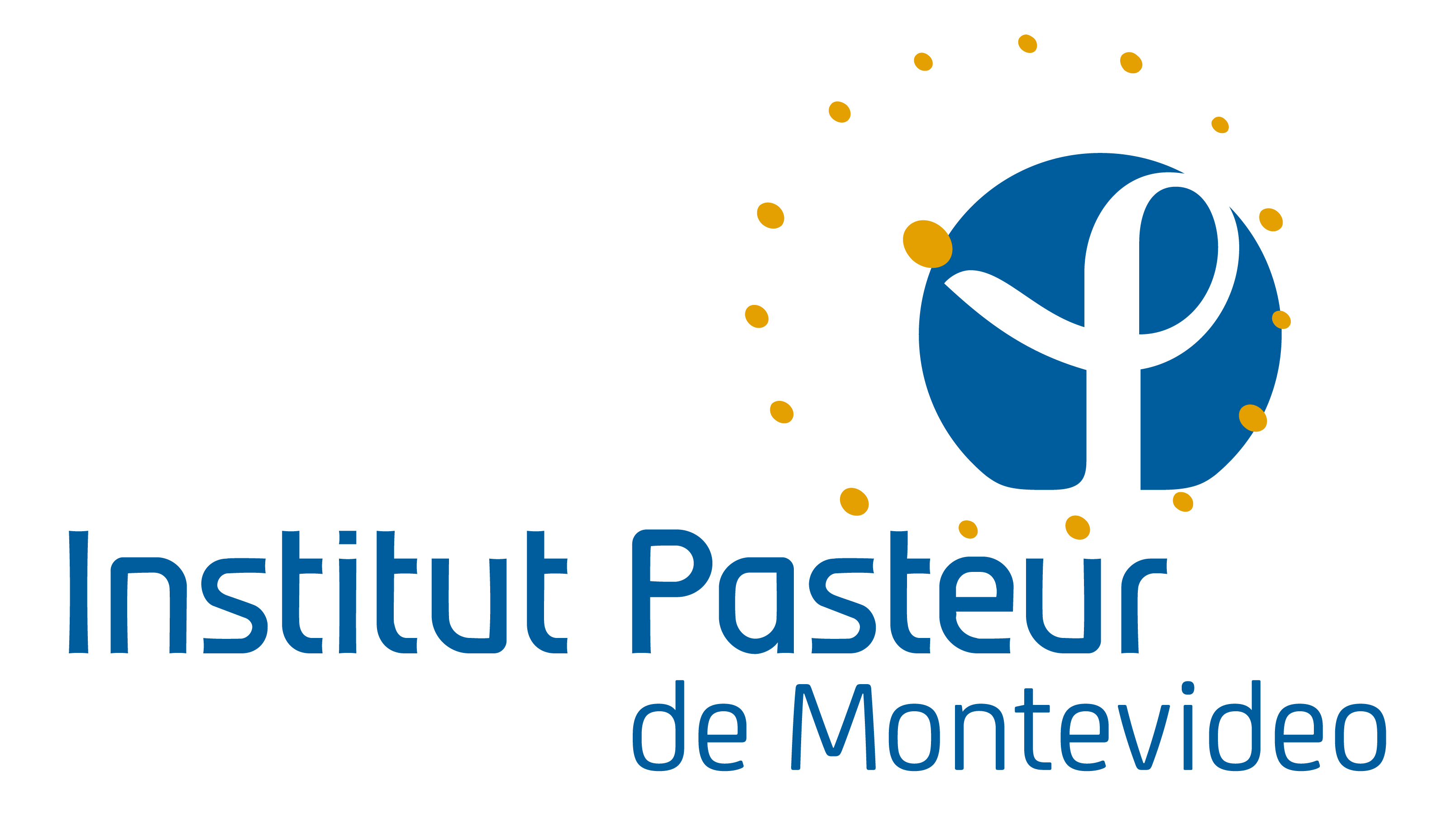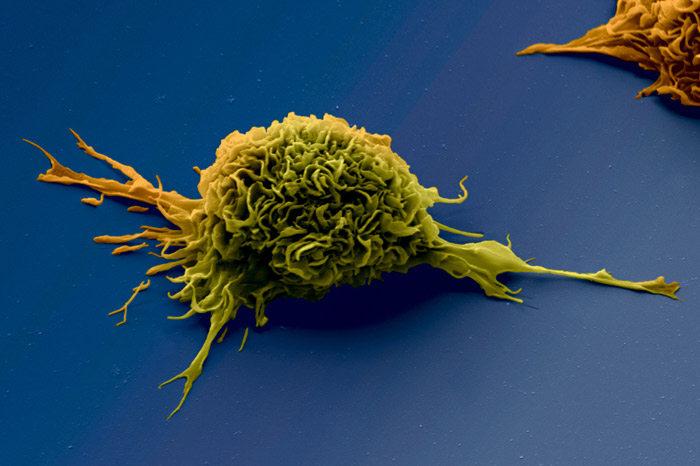Inmunoregulación e Inflamación
La desregulación del sistema inmune puede llevar a afectaciones crónicas que se conocen bajo el nombre de enfermedades inflamatorias inmuno-mediadas (EII). Las EII incluyen más de 80 entidades clínicas que llegan a afectar a cerca de 10% de la población en el mundo occidental. Entre ellas se encuentran las enfermedades autoinflamatorias y autoinmunes. La investigación básica está permitiendo caracterizar mecanismos fisiológicos encargados de controlar el desarrollo de respuestas inflamatorias y adaptativas mediadoras de efectos patológicos, y ese conocimiento es crítico para innovar a nivel de estrategias dirigidas al sistema inmune y para comprender el mecanismo de acción de drogas de uso corriente.
Nuestro grupo se interesa en el estudio de mecanismos celulares y moleculares que controlan el proceso inflamatorio y la respuesta inmune adaptativa. Nos focalizamos en la biología de células dendríticas (DCs), ya que constituyen una sub-población de leucocitos capaces de orquestar respuestas inmunes adaptativas efectoras, al tiempo que disponen de potentes estrategias capaces de regular el desarrollo del proceso inflamatorio y de la respuesta adaptativa. Nuestro trabajo intenta cubrir aspectos relevantes y originales a nivel de mecanismos moleculares buscando al mismo tiempo la pertinencia desde un punto de vista de salud humana.
En este marco, el laboratorio ha caracterizado los transportadores iónicos emergentes TORID-1 (Tmem176b) y TORID-2 (Tmem176a), que son reguladores críticos de la activación del inflamasoma NLRP3. La regulación del inflamasoma por TORID-1 ha mostrado ser relevante en la respuesta inmune anti-tumoral. Hemos caracterizado inhibidores farmacológicos de TORID-1 y TORID-2 que han sido caracterizados a nivel pre-clínico como prometedoras drogas anti-tumorales.
Integrantes
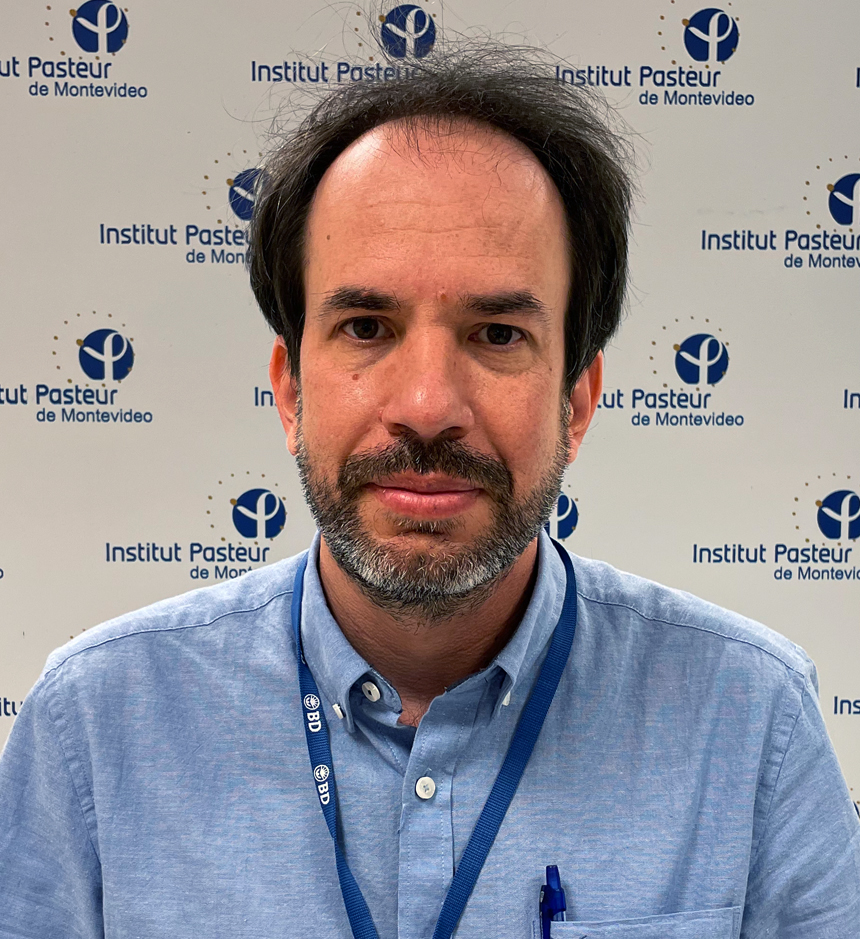
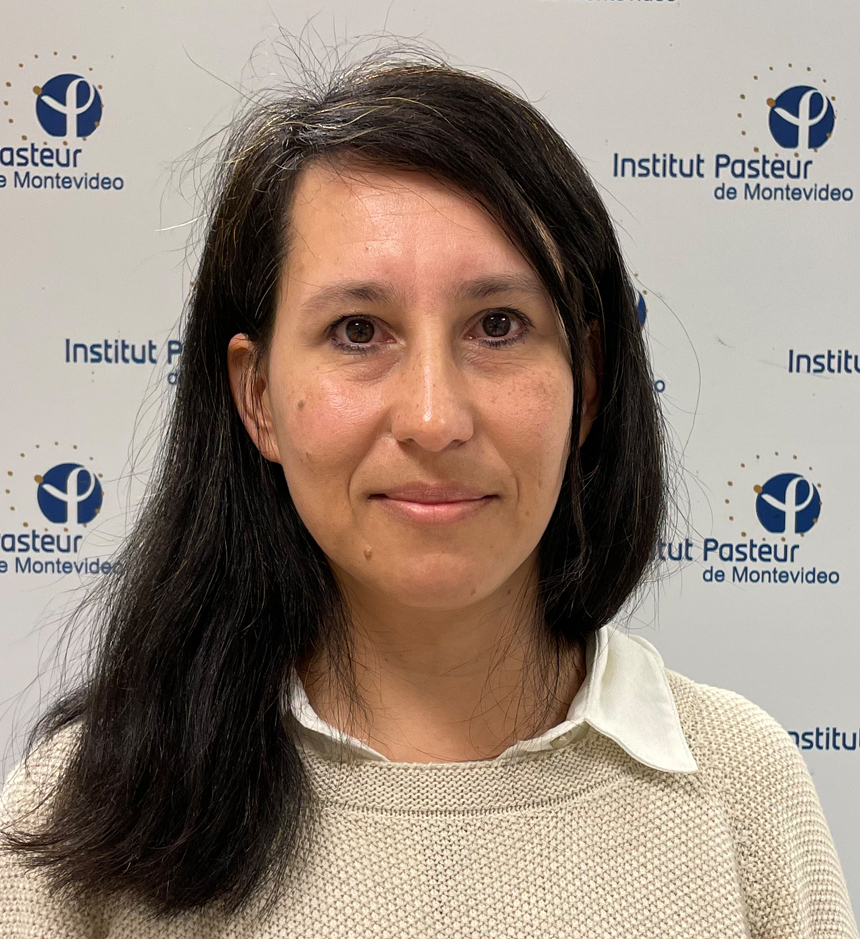
MD Mercedes Segovia, PhD
Investigadora asociada honoraria
Facultad de Medicina, Udelar
msegovia@pasteur.edu.uy
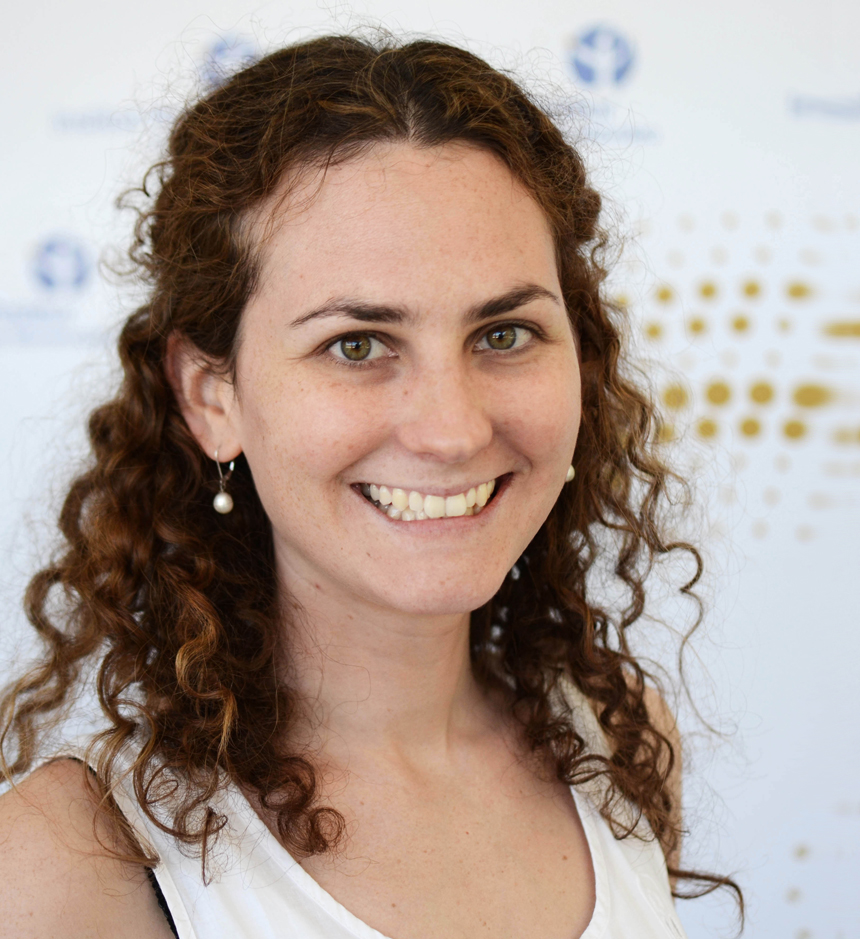
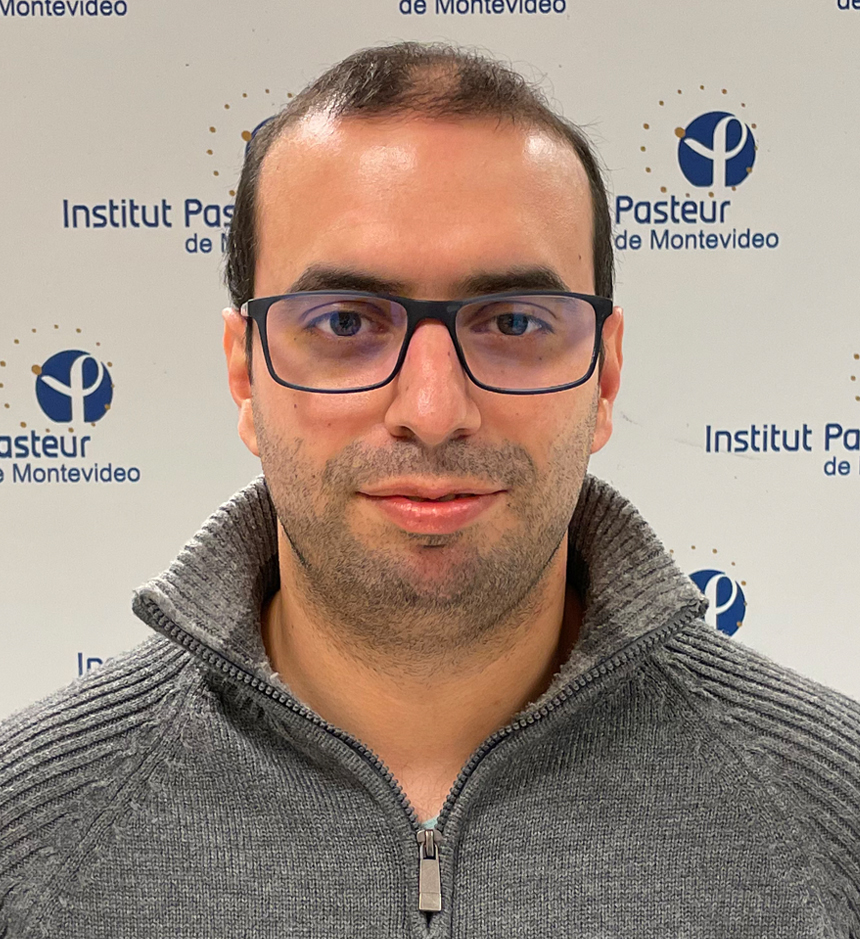
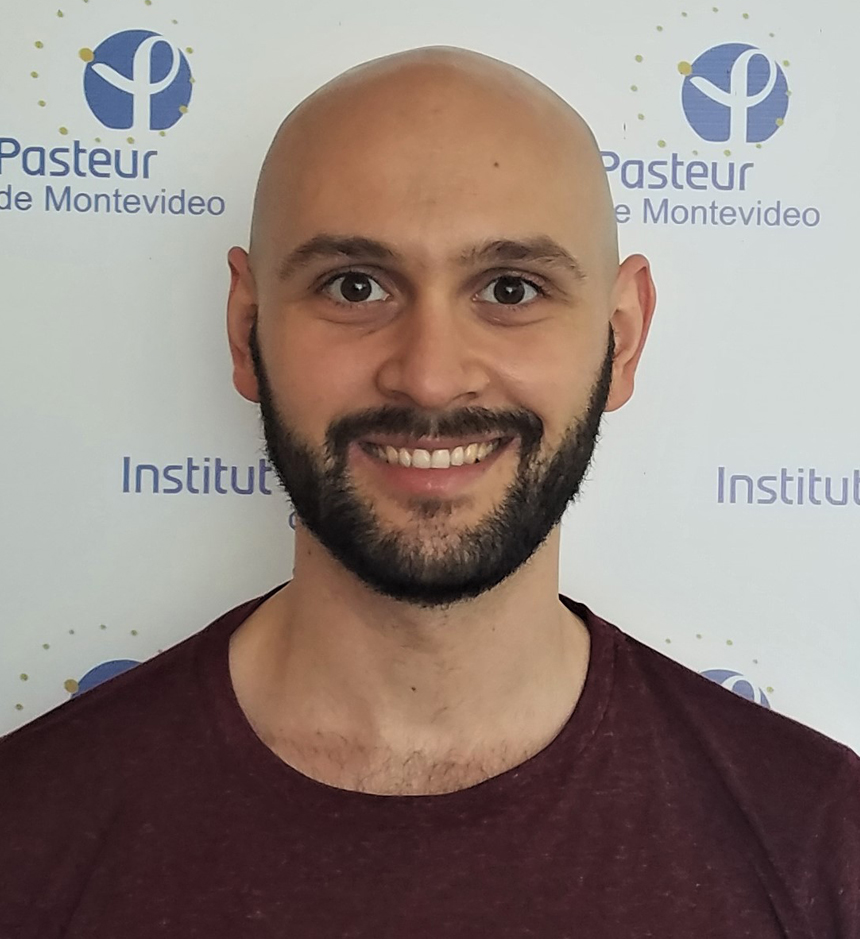
Mauricio Castellano, MSc
Estudiante de doctorado
Facultad de Ciencias, Udelar
mcastellano@pasteur.edu.uy
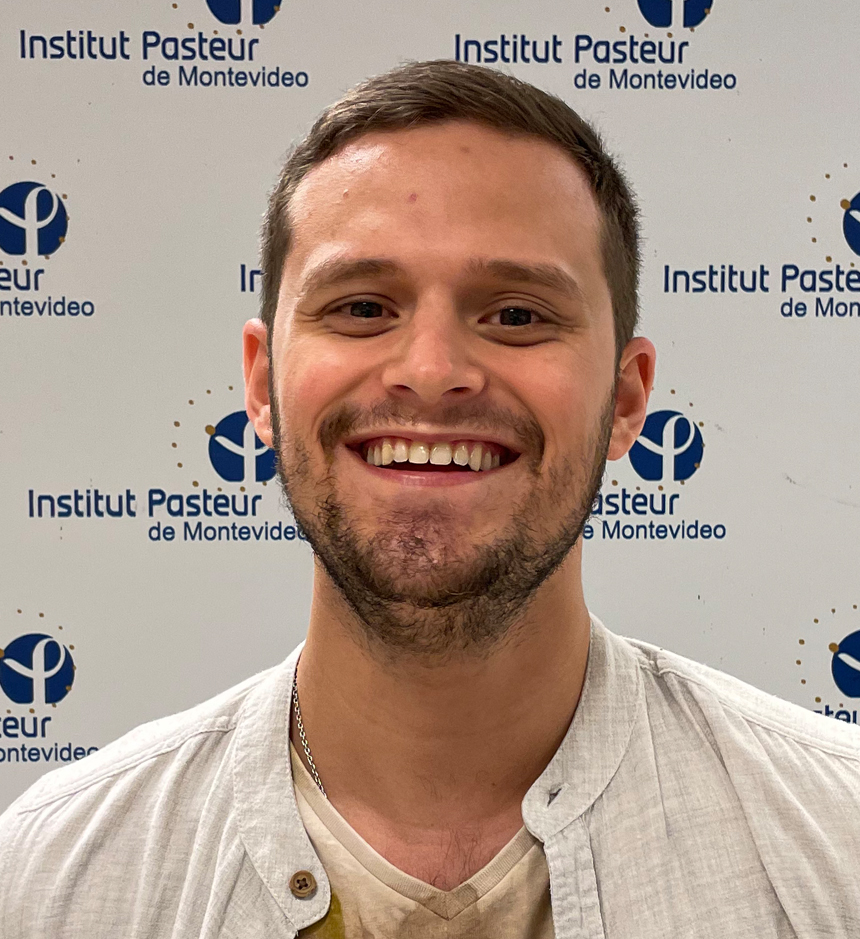
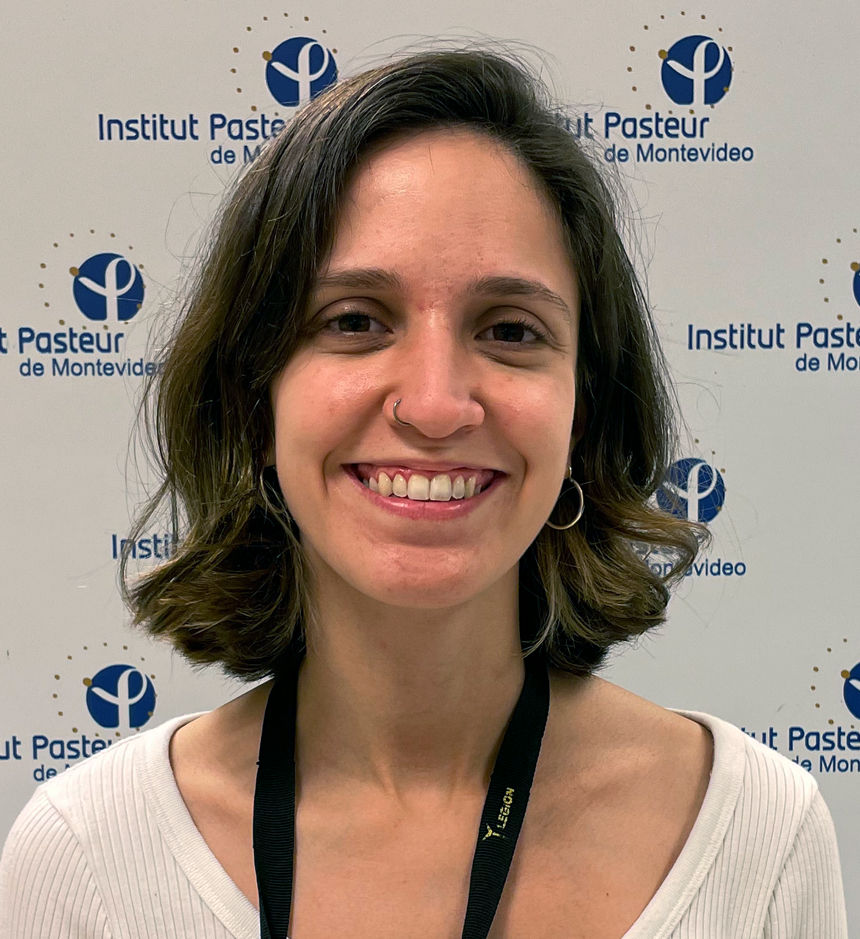
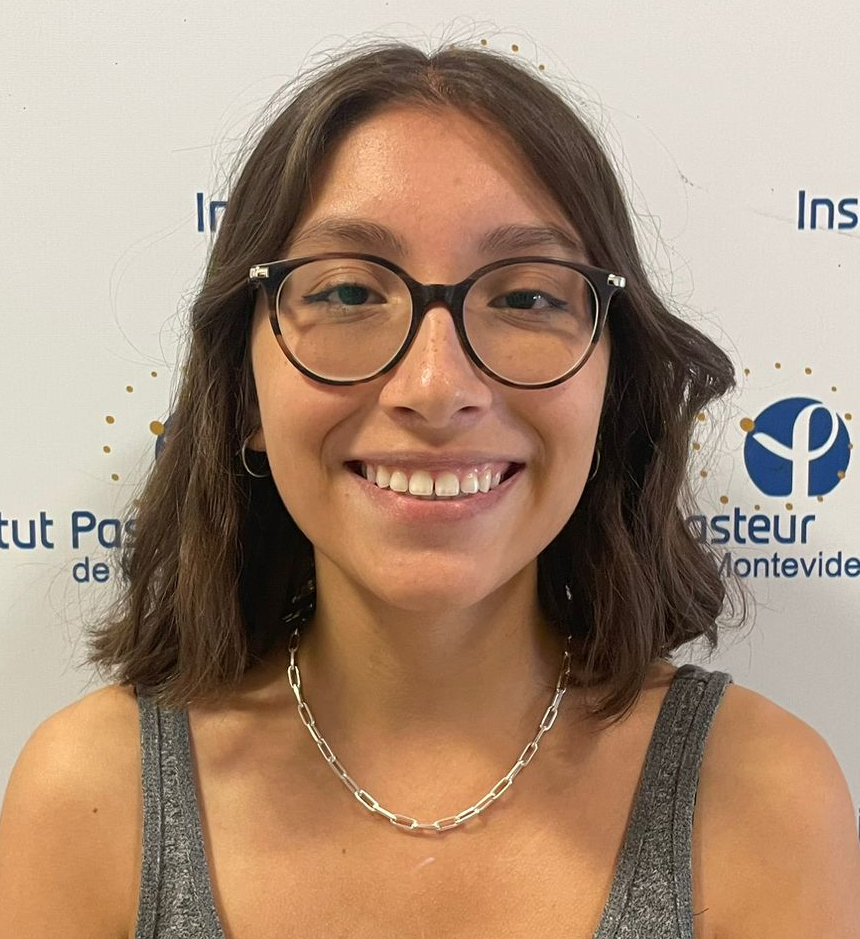
Cecilia Córdoba
Pasante
Líneas de investigación
Papel de la proteína intracelular TORID-1 en respuestas inmunitarias antitumorales.
Papel de las proteínas intracelulares TORID-1 y TORID-2 en la biología de la leucemia linfocítica crónica
Caracterización de pequeñas moléculas capaces de inhibir o activar la conductancia mediada por TORID-1 y 2.
Papel de la proteína intracelular TORID-1 en la obesidad y la inflamación inducida por la obesidad.
Estudio de drogas anti-inflamatorias no convencionales como inmunomoduladores en trasplante de órganos.
Cursos
- “Challenges in cancer immunotherapy. International workshop”, 2018.
- “Update on immunology: from mechanisms to immunotherapy and vice versa. Jornada Científica de la SUI”, 2016. Coordinadores: Marcelo Hill, Maria Moreno y Mercedes Segovia.
- “Fundamentos básicos y clínicos del proceso inflamatorio. Curso optativo de la carrera de Dr. en Medicina”, 2014. Facultad de Medicina. Coordinador: Dr. Marcelo Hill.
- “Bases inmunológicas de fármacos biológicos utilizados en medicina”, 2013. Curso de post-grado, Facultad de Medicina, Udelar. Coordinadores: Dr. Marcelo Hill, Dra. Caroline Agorio y Dr. Eduardo Osinaga.
- “Tolerancia vs Inmunidad: ¿cómo y por qué?”, 2012. Curso PEDECIBA. Coordinadores: Dra. Teresa Freire y Dr. Marcelo Hill. Depto. de Inmunobiologia, Facultad de Medicina, Udelar.
Proyectos
2017-2018 – Caracterización de un nuevo regulador de la Inflamación. ANII. FCE_3_2016_1_126894. Responsable: Mercedes Segovia.
2018-2019 – Bloqueo farmacológico de un nuevo inhibidor de la respuesta inmune anti-tumoral. ANII. FMV_1_2017_1_136177. Responsable: Marcelo Hill.
2015‐2018 – Desarrollo y validación de procesos para el estudio y valorización de nutracéuticos: creación de la primera empresa uruguaya del tipo. Participación: investigador.
2018-2019 – Characterization of novel molecular players in the control of obesity and obesity-induced inflammation. Agence des Universités Francophones. FAPESP. Responsables: Marcelo Hill, Carlos Escande, Alessandra Pontillo (USP).
Publicaciones
vacio
2017
- Pro-inflammatory Ca++-activated K+ channels are inhibited by hydroxychloroquine. Schroeder ME, Russo S, Costa C, Hori J, Tiscornia I, Bollati-Fogolín M, Zamboni DS, Ferreira G, Cairoli E, Hill M. Sci Rep. 2017 May 15;7(1):1892. doi: 10.1038/s41598-017-01836-8.
2016
- Comparative Study of the Immunoregulatory Capacity of In Vitro Generated Tolerogenic Dendritic Cells, Suppressor Macrophages, and Myeloid-Derived Suppressor Cells. Carretero-Iglesia L, Bouchet-Delbos L, Louvet C, Drujont L, Segovia M, Merieau E, Chiffoleau E, Josien R, Hill M, Cuturi MC, Moreau A. Transplantation. 2016 Oct;100(10):2079-2089.
- Generation and Characterization of Mouse Regulatory Macrophages. Carretero-Iglesia L, Hill M, Cuturi MC. Methods Mol Biol. 2016;1371:89-100. doi: 10.1007/978-1-4939-3139-2_6
2015
- Phenotypic Analysis of Immunocompetent Cells in Healthy Human Dental Pulp. Gaudin A, Renard E, Hill M, Bouchet-Delbos L, Bienvenu-Louvet G, Farges JC, Cuturi MC, Alliot-Licht B. J Endod. 2015 Feb 18. pii: S0099-2399(15)00014-X.
2014
- Combining autologous dendritic cell therapy with CD3 antibodies promotes regulatory T cells and permanent islet allograft acceptance. Baas MC, Kuhn C, Valette F, Mangez C, Duarte MS, Hill M, Besançon A, Chatenoud L, Cuturi MC, You S. J Immunol. 2014 Nov 1;193(9):4696-703.
- Evaluation of the therapeutic potential of bone marrow-derived myeloid suppressor cell (MDSC) adoptive transfer in mouse models of autoimmunity and allograft rejection. Drujont L, Carretero-Iglesia L, Bouchet-Delbos L, Beriou G, Merieau E, Hill M, Delneste Y, Cuturi MC, Louvet C.
PLoS One 2014 Jun 13;9(6) - Autologous dendritic cells prolong allograft survival through Tmem176b-dependent antigen cross-presentation. Mercedes Segovia, Cedric Louvet, Pierre Charnet, Ariel Savina, Gaelle Tilly, Laetitia Gautreau, Laura Carretero-Iglesia, Gaelle Beriou, Ignacio Cebrian, Thierry Cens, Lucy Hepburn, Elise Chiffoleau, Rodrigo Andres Floto, Ignacio Anegon, Sebastian Amigorena, Maria Cristina Cuturi and Marcelo Hill. Am J Transplant. 2014 May;14(5):1021-31
2013
- Carbon monoxide decreases endosome-lysosome fusion and inhibits soluble antigen presentation by dendritic cells to T cells. Tardif V, Riquelme SA, Remy S, Carreño LJ, Cortés CM, Simon T, Hill M, Louvet C, Riedel CA, Blancou P, Bach JM, Chauveau C, Bueno SM,Anegon I, Kalergis AM. Eur J Immunol. 2013 Nov;43(11):2832-44
2011
- Penicillin binding proteins as danger signals: meningococcal PBP2 activates DCs through TLR4. Marcelo Hill, Ala-Eddine Deghmane, Mercedes Segovia, Maria Leticia Zarantonelli, Gaëlle Tilly, Philippe Blancou, Régis Josien, Ignacio Anegon, Eva Hong, Corinne Ruckly, Aude Antignac, Meriem El Ghachi, Ivo Gomperts Boneca, Muhamed-Kheir Taha and Maria Cristina Cuturi. PLoS One. 2011; 6(10):e23995. Epub 2011 Oct 27.
- Cell therapy with autologous tolerogenic dendritic cells induces allograft tolerance through IFN-γ and EBI3. Marcelo Hill, Paméla Thebault, Mercedes Segovia, Cédric Louvet, Gaëlle Bériou, Gaëlle Tilly, Emmanuel Merieau, Ignacio Anegon, Elise Chiffoleau and Maria-Cristina Cuturi. Am J Transplant. 2011 Oct; 11(10):2036-45. doi: 10.1111/j.1600-6143.2011.03651.x.
- What is the role of antigen processing mechanisms in autologous Tol-DC therapy in organ transplantation? Marcelo Hill, Mercedes Segovia and Maria Cristina Cuturi. Immunotherapy. 2011 Apr; 3(4 Suppl):12-4. Review.
- Preparation of mouse bone marrow-derived dendritic cells with immuno-regulatory properties. Mercedes Segovia, Maria Cristina Cuturi and Marcelo Hill. Methods Mol Biol. 2011; 677:161-8.
2010
- Negative vaccination by tolerogenic dendritic cells in organ transplantation. Marcelo Hill and Maria Cristina Cuturi. Curr Opin Organ Transplant 2010. Sep 24. [Epub ahead of print]
- Tmem176B and Tmem176A are associated with the immature state of dendritic cells. Condamine T, Le Texier L, Howie D, Lavault A, Hill M, Halary F, Cobbold S, Waldmann H, Cuturi MC, Chiffoleau E. J Leukoc Biol. 2010 Sep; 88(3):507-15. Epub 2010 May 25.
- Mechanism and localization of CD8 regulatory T cells in a heart transplant model of tolerance. Li XL, Ménoret S, Bezie S, Caron L, Chabannes D, Hill M, Halary F, Angin M, Heslan M, Usal C, Liang L, Guillonneau C, Le Mauff B, Cuturi MC, Josien R, Anegon I. J Immunol. 2010 185(2):823-33
- A novel, clinically-relevant animal model to study galectin-3 and its ligands during colon carcinogenesis. Marcelo Hill, Daniel Mazal, Laura Pereyra, Luis Ubillos, Edgardo Berriel, Teresa Freire, Mariella Rondán, Gerardo Vasta, Fu-Tong Liu, María Mercedes Iglesias and Eduardo Osinaga. J. Histochem Cytochem. 2010 58(6):553-65.
2009
- Tolerogenic dendritic cells actively inhibit T cells through heme oxygenase-1 in rodents and in non-human primates. Moreau A., Hill M., Thébault P., Deschamps J.Y., Chiffoleau E., Chauveau C., Moullier P., Anegon I., Alliot-Licht B. and Cuturi M.C. FASEB J. 2009 (23) 9 3070-77.
- Endotoxin challenge induces myeloid-derived suppressor cells controlling allograft rejection through heme oxygenase-1. V. De Wilde, N. Van Rompaey, M. Hill, J.F. Lebrun, P. Lemaître, F. Lhommé, C. Kubjak, B. Vokaer, G. Oldenhove, L.M. Charbonnier, M.C. Cuturi, M.Goldman, and A. Le Moine. Am J Transp. 2009. 9 (9) 2034-47.
- Lack of immunotoxicity after regional intravenous (RI) delivery of rAAV to nonhuman primate skeletal muscle. Alice Toromanoff, Oumeya Adjali, Thibaut Larcher, Marcelo Hill, Lydie Guigand, Pierre Chenuaud, Jack-Yves Deschamps, Olivier Gauthier, Gilles Blancho, Bernard Vanhove, Fabienne Rolling, Yan Chérel, Philippe Moullier, Ignacio Anegon, Caroline Le Guiner. Mol Ther. 2009 Nov 3. [Epub ahead of print]
2007
- IDO expands human CD4+CD25high regulatory T cells by promoting maturation of LPS-treated dendritic cells. Marcelo Hill, Séverine Tanguy-Royer, Pierre Royer, Christine Chauveau, Kashif Asghar, Frédéric Lavainne, Séverine Rémy, Régis Brion, François-Xavier Hubert, Michèle Heslan, Marie Rimbert, Laureline Berthelot, John Moffet, Régis Josien, Marc Grégoire and Ignacio Anegon. EurJ Immunol. 2007, 37 (11) 3054-62
- Nitric oxide and indoleamine 2,3-dioxygenase mediate CTLA4Ig-induced survival of heart allografts in rats. Marcelo Hill, Rachid Zagani, Cécile Voisine and Ignacio Anegon. Transplantation. 2007, 84 (8) 1060-3
- A role for heme oxygenase 1 in the immunosuppressive effect of adult rat and human Mesenchymal Stem Cells. Dominique Chabannes, Marcelo Hill, Emmanuel Merieau, Julien Rossignol, Régis Brion, Jean Paul Soulillou, Ignacio Anegon and Maria Cristina Cuturi. Blood. 2007 Nov 15;110(10):3691-4.
- Role of IFN-γ in allograft tolerance mediated by CD4+CD25+ regulatory T cells by induction of IDO in endothelial cells. Thebault P., Condamine T., Heslan M., Hill M., Saoudi A. , Josien R., Anegon I., Cuturi M.C. and Chiffoleau E. Am J Transp. 2007, 7 (11) 2472-82
- CD40Ig treatment results in allograft acceptance mediated by CD8+CD45RClow T cells, IFN-γ and indoleamine 2,3-dioxygenase. Carole Guillonneau, Marcelo Hill, François-Xavier Hubert, Elise Chiffoleau, Caroline Hervé, Xiang-Liang Li, Michèlle Heslan, Claire Usal, Laurent Tesson, Séverine Ménoret, Abdelhadi Saoudi, Brigitte Le Mauff, Régis Josien, Maria Cristina Cuturi and Ignacio Anegon. J Clin Invest. 2007. 117 (4) 1096-106
2006
- Influence of local and systemic CTLA4Ig gene transfer on corneal allograft survival. Gong N, Yang Y, Pleyer U, Vogt K, Hill M, Anegon I, Volk HD, Ritter T. The Journal of Gene Medicine. 2006, 8 (4) 459-67.
- Anti-donor class II antibodies induces tolerance to a full MHC mismatched kidney graft by a mechanism involving a T/ non T cells interaction and the indoleamine 2,3-dioxigenase pathway. N. Degauque, D. Lair, A. Dupont, A. Moreau, G. Roussey, F. Moizant, FX. Hubert, C. Louvet, M. Hill, F. Haspot, R. Josien, C. Usal, B. Vanhove, JP. Soulillou and S. Brouard. J Immunol. 2006, 176: 3915-3922.
